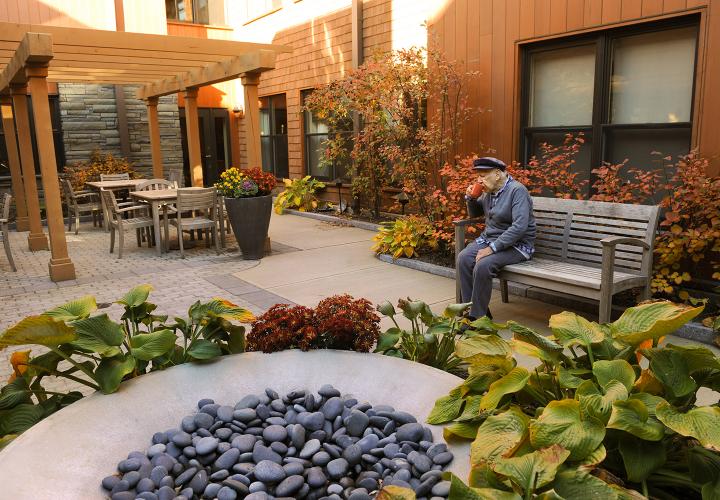Family-Oriented Facilities Offering Personalized Alzheimers Care Charlotte
Family-Oriented Facilities Offering Personalized Alzheimers Care Charlotte
Blog Article
Producing a Safe and Supportive Setting for Alzheimer's Care
The production of a encouraging and safe setting for individuals with Alzheimer's is paramount in improving their high quality of life. This involves not just physical adjustments within the home, such as decreasing hazards and integrating acquainted components, however also the application of organized routines and significant tasks that accommodate their cognitive demands. Recognizing the emotional and psychological dimensions of care can substantially influence their sense of safety and link. Discovering these multifaceted methods can disclose critical insights into efficient caregiving methods that might change the daily experiences of both clients and caregivers.
Comprehending Alzheimer's Needs
Often, individuals with Alzheimer's disease exhibit a range of demands that call for customized strategies to care. As the problem proceeds, cognitive decrease shows up in numerous ways, impacting memory, thinking, and also the capability to carry out daily activities. Caretakers have to identify these progressing needs to supply suitable assistance and ensure a better of life for those impacted.
One important element of understanding Alzheimer's demands is identifying the significance of routine and knowledge. Individuals frequently locate convenience in recognized patterns, which can reduce anxiousness and confusion. Caretakers ought to strive to produce structured day-to-day schedules that include significant tasks lined up with the person's capacities and rate of interests.
In addition, efficient interaction is vital. Individuals with Alzheimer's might struggle to reveal themselves or comprehend complex language. Caretakers should use easy, clear language, usage non-verbal cues, and technique active paying attention to foster understanding and link.
Caregivers must urge engagement in community activities or household celebrations, advertising a sense of belonging and purpose. Comprehending these varied demands is crucial for developing a helpful treatment setting.
Creating a Safe Home
Producing a secure home for people with Alzheimer's disease is essential to decreasing dangers and promoting freedom. Guarantee that pathways are well-lit and clear, as appropriate illumination lowers disorientation and improves flexibility.
Integrating adaptive attributes is likewise crucial. Set up grab bars in bathrooms and near staircases, and consider utilizing non-slip mats in damp areas. In addition, utilizing different colors for floorings and wall surfaces can help in identifying spaces, assisting to minimize confusion.
Knowledge is necessary for people with Alzheimer's. Personalizing the atmosphere with acquainted objects and photos can enhance a feeling of belonging and safety and security - Alzheimers Care Charlotte. It is also helpful to have actually a designated location for day-to-day activities, such as reading or crafting, which can supply framework to their day
Last but not least, executing a safe exterior room enables safe exploration while getting in touch with nature. By attentively making the home setting, caregivers can considerably improve the lifestyle for people coping with Alzheimer's condition.
Enhancing Interaction Abilities

Non-verbal interaction, including faces, motions, and touch, plays a vital function in conveying compassion and understanding. Preserving eye contact and a tranquil temperament can improve the comfort level of the person, promoting a feeling of safety and security.
Furthermore, it is essential to practice energetic listening. This involves being totally present, showing perseverance, and enabling the person to share themselves without disruption. Repetition might be required; caretakers must be prepared to revisit subjects or concerns, as individuals with Alzheimer's might deal with memory recall.
In addition, utilizing aesthetic aids or signs, such as photographs or acquainted objects, can facilitate recognition and interaction. Eventually, improving communication abilities has to do with constructing trust and producing an atmosphere where people feel heard, valued, and understood, consequently improving their lifestyle.
Motivating Social Communication
Fostering purposeful social communications can substantially enhance the health of individuals with Alzheimer's illness. Engaging with others not only assists see here battle feelings of seclusion yet additionally boosts cognitive function and emotional health. Structured social activities, such as team crafts, arts and games, or music treatment, develop chances for residents to get in touch with peers and caregivers, which can cause improved state of mind and reduced anxiousness.
Creating an inviting atmosphere that urges socializing is crucial. This can be achieved by setting up common rooms that promote interaction, such as cozy seating areas or activity spaces. In addition, integrating familiar and culturally relevant tasks can stimulate memories and urge participation, permitting individuals with Alzheimer's to feel more linked to their previous experiences.
Moreover, caregivers need to be educated to acknowledge and advertise social interaction among residents. By focusing on social communication, we can dramatically enrich the lives of those living with Alzheimer's, fostering a feeling of area and belonging.
Supporting Caretaker Health

To sustain caregivers, companies must provide regular training and academic sources to enhance their understanding of Alzheimer's illness and caregiving techniques. Offering accessibility to break treatment services enables caregivers to take needed breaks, minimizing tension and fatigue - Alzheimers Care Charlotte. In addition, fostering a neighborhood with support teams can facilitate psychological sharing and the exchange of practical suggestions amongst caregivers, producing a network of mutual assistance
Psychological health and wellness resources, such as counseling solutions, can additionally be vital in attending to the psychological toll caregiving can take. By prioritizing caregiver health, we create an even more lasting caregiving environment that not just profits the caretakers themselves however likewise improves the general quality of treatment gotten by people with Alzheimer's. Inevitably, sustaining caregivers is an essential part in cultivating a thoughtful and reliable care setting.
Final Thought
In verdict, the development of a helpful and safe environment for people with Alzheimer's is vital to boosting their high quality of life. By focusing on safety and security through thoughtful layout, promoting emotional health with familiar components, and promoting engagement through structured regimens, caregivers can considerably affect the overall experience of those affected by this condition. In addition, supporting caregiver health is critical, as it eventually adds to an extra effective and thoughtful care environment.
Repetition may be required; caretakers ought to be prepared to take another look at concerns or subjects, as people with Alzheimer's may have a hard time with find out here memory recall.

Report this page